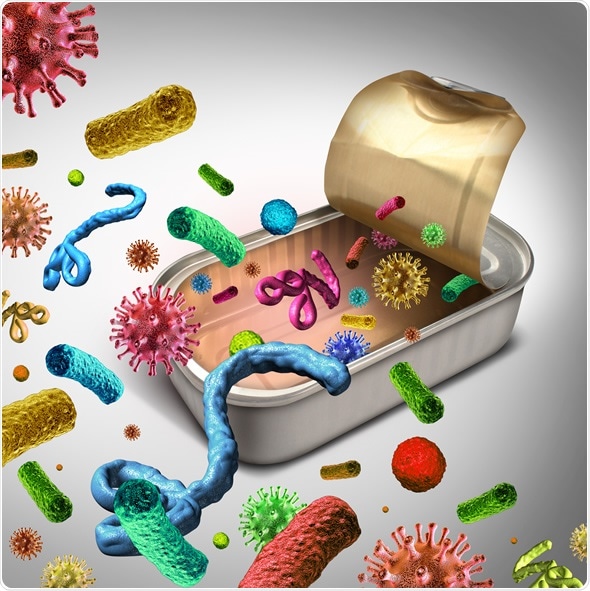Commonly referred to as food poisoning or foodborne disease, foodborne illnesses (FIs) are gastrointestinal (GI) tract infections that arise with the ingestion of contaminated food. The main culprits are usually microorganisms or chemical agents.
They typically present with acute signs and symptoms and most people tend to recover without any major long-term complications or the need for medical intervention. However, this is largely dependent on the status of the affected person's immune system. Those who are immunocompromised or find themselves at the extremes of age (i.e. the very young and the elderly) are particularly vulnerable.
Causes
There are over 250 different FIs described in literature and the majority of them are due to bacteria, viruses and parasites. The remainder are due to chemicals that are found for instance in some species (e.g. mushroom poisoning). Some organisms or toxins are more pathogenic than others and thus inflict more severe symptoms.

Image Copyright: Lightspring / Shutterstock
Bacteria
While some of these microorganisms are 'our friends' and are found in our gut as vital parts of our physiological functioning, others are 'foes' and may hitchhike into our GI tract in foods and contaminated liquids. Raw foods, in particular poultry, meat, fish, milk, dairy products and fresh produce are common sources of foodborne illnesses.
In addition to these, food contamination may also occur during preparation from contaminated to uncontaminated. Furthermore, inadequate cooking and/or storage may lead to bacteria not being killed thoroughly and multiplying/forming spores, respectively.
Foodborne Illness Video Testimonials -- Bernadette/Kate Jacobs
Many different bacterial species are implicated in food poisoning. Some examples include campylobacter, salmonella, shigella and E. coli. Campylobacter bacteria are among the most common causes of food poisoning in the UK and are found in raw or undercooked chicken and unpasteurized milk.
Salmonella is another bacterium found in raw meat, poultry and diary products. Shigella is easily spread from person to person, because it is present in the stools of people who become infected and is transmitted by poor hand-toilet hygiene. Another pathogenic bacterium, E. coli 0157:H7, is found in unpasteurized milk, fresh produce and raw or undercooked hamburgers.
Viruses
These microorganisms are much smaller than bacteria but are just as capable of causing FIs. They easily spread between people because they are present in large quantities in bodily fluids such as vomit or stool. Some common viruses implicated in FIs are norovirus and hepatitis A which inflame the lining of the GI tract and liver, respectively. Common sources of viral FIs include food contamination by an infected person, shellfish and fruits and vegetables that are irrigated with contaminated water.
Natural toxins
Aflatoxins are one example of toxins in this category and are produced by Aspergillus flavus and Aspergillus parasiticus. They are commonly found in peanuts, tree nuts and maize. These toxins target the liver and can cause serious complications such as cell death, cirrhosis and cancer. Other toxins include tetrodotoxin (found in fugu fish), shellfish toxin, mushroom toxins and phytohaemagglutinin, found in red kidney beans and destroyed by boiling.
Parasites
These are organisms that like to cohabitate in other organisms and are frequent causes of FIs in tropical countries. Examples include Cryptosporidium parvum and Giardia intestinalis. These parasites are spread through contaminated water and are present in the stools of infected animals and people.
Signs, Symptoms and Complications
The clinical presentation of FIs depends mainly on the underlying cause. However, global symptoms include fever, chills, abdominal pain, vomiting and watery or bloody diarrhea. These symptoms may last for a few hours up to several days. Other serious symptoms with toxins that target the nervous system (e.g. C. botulinum from canned foods) include tingling, numbness, paralysis, weakness, dizziness, visual disturbances, constipation, difficulty breathing and slurred speech.
Complications that may arise from FIs include dehydration due to vomiting and/or diarrhea, hemolytic uremic syndrome (HUS) with E. coli O157:H7 infection, reactive arthritis, irritable bowel syndrome (IBS) and Guillain Bare syndrome (GBS).
HUS is rare but affects primarily children under the age of 10 and is due to the bacteria producing toxins that target the red blood cells leading to their destruction. HUS is associated with bloody diarrhea, abdominal pain and fever. It may cause acute renal failure and children who recover may tend to develop kidney problems later on in life. GBS is characterized by muscle weakness and may be seen in persons who were infected with campylobacter, but recovery occurs within 12 months. Reactive arthritis and IBS tend to resolve within half a year.
Treatment and Prevention
Treatment of FIs is largely dependent on the causative agent, but most FIs only require fluid replacement to avoid dehydration. Medications may be prescribed to ease symptoms such as vomiting and diarrhea. Hospitalization is only required in cases of life threatening complications such as HUS, paralysis and severe dehydration. The key to FIs prevention is proper hygiene with regards to eating, preparing and storing food. This entails washing hands properly, cooking foods thoroughly and storing them at adequate temperatures.
Rule of thumb: cold foods should be kept cold, hot foods should be kept hot and hands, utensils and preparation areas should be washed properly after handling raw foods.
References
Further Reading
Last Updated: Dec 29, 2022